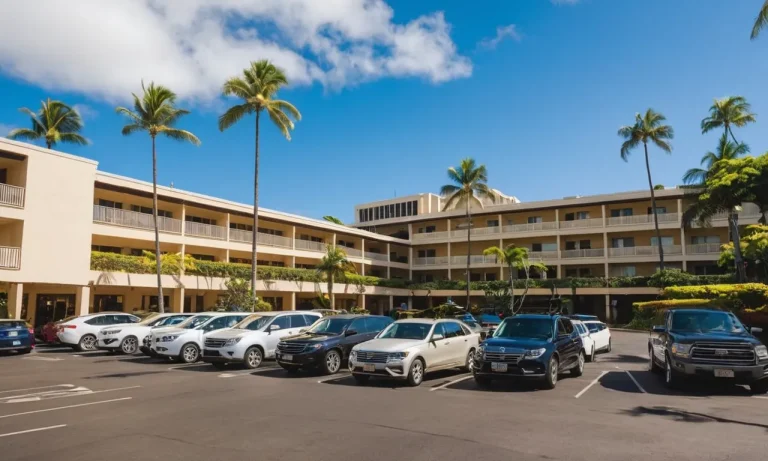Is Living in a Hotel Cheaper Than Renting? A Comprehensive Guide
In today’s ever-changing housing market, finding an affordable living situation can be a daunting task. With rent prices soaring and the cost of living on the rise, many people are exploring alternative options, including the possibility of living in a hotel.
But is this truly a more cost-effective solution? Let’s dive into the details.
If you’re short on time, here’s a quick answer to your question: Living in a hotel can be cheaper than renting in certain situations, but it ultimately depends on various factors such as location, duration of stay, and the amenities you require.
In this comprehensive article, we’ll explore the pros and cons of hotel living, compare the costs with traditional renting, and provide you with valuable insights to help you make an informed decision.
We’ll cover topics such as long-term hotel rates, hidden fees, amenities, and the overall lifestyle implications of living in a hotel versus renting an apartment or house.
Understanding the Cost Breakdown
When it comes to deciding whether living in a hotel is cheaper than renting an apartment, it’s crucial to break down the costs involved. This comprehensive guide will delve into the nitty-gritty of hotel rates, long-term discounts, and rental costs in your area, giving you a clear picture of the financial implications of each option.
Buckle up, folks, because we’re about to crunch some numbers! 🧮
Average Hotel Rates
Let’s start with the elephant in the room: hotel rates. According to data from Statista, the average daily rate for hotels in the United States in 2022 was around $148. However, this figure can vary significantly depending on the location, hotel class, and seasonality.
For instance, luxury hotels in major cities like New York or San Francisco can easily cost upwards of $300 per night, while budget motels in smaller towns might hover around $50-$80 per night.
Long-Term Hotel Discounts
Here’s where things get interesting. Many hotels offer substantial discounts for extended stays, making them a potential contender for affordable long-term accommodation. According to Hotels.com, you can typically expect discounts ranging from 15% to 50% for stays of a month or longer.
Some hotels even offer additional perks like kitchenettes, laundry facilities, and complimentary breakfast, further sweetening the deal. 😋
For example, let’s say you find a hotel offering a monthly rate of $2,500 (including taxes and fees). That’s roughly $83 per night, which might be a steal compared to renting a one-bedroom apartment in a prime location.
Of course, you’ll have to weigh the pros and cons of hotel living, such as lack of personal space and amenities like a full kitchen.
Rental Costs in Your Area
Ah, the age-old question: “What’s the cost of renting in my area?” This is where things get a bit tricky, as rental costs can vary drastically depending on your location, the size of the rental unit, and its amenities.
According to RentData, the average rent for a one-bedroom apartment in the United States was around $1,292 in 2022, but this figure can range from $800 in some states to over $2,500 in others.
To get a better idea of rental costs in your area, it’s best to consult local real estate websites or rental listing platforms like Apartments.com or Zillow. These resources can provide you with up-to-date information on rental rates, as well as insights into the local housing market.
| Option | Average Cost | Pros | Cons |
|---|---|---|---|
| Hotel (Monthly Rate) | $2,500 | Potential discounts, amenities | Lack of personal space, limited kitchen |
| One-Bedroom Apartment | $1,292 | More space, privacy, full kitchen | Higher upfront costs, long-term commitment |
Factors to Consider When Comparing Hotel Living to Renting
When it comes to deciding between living in a hotel or renting a traditional apartment or house, there are several key factors to consider. This decision can have a significant impact on your lifestyle, budget, and overall living experience. Let’s delve into these crucial elements:
Duration of Stay
The length of your intended stay plays a pivotal role in determining whether hotel living or renting is the more cost-effective option. Generally, hotels are more suitable for short-term stays, such as business trips, vacations, or temporary relocation periods.
According to a study by Statista, the average daily rate for hotels in the United States in 2022 was around $148. Renting, on the other hand, is typically more economical for longer-term stays, as monthly rental costs are often lower than the cumulative cost of an extended hotel stay.
Location and Proximity
The desired location and proximity to essential amenities, workplaces, or attractions can significantly influence your choice between a hotel and a rental property. Hotels are usually situated in prime locations, offering easy access to restaurants, shopping centers, and tourist attractions.
However, this convenience often comes at a higher cost. Rental properties may be more affordable but could be located farther away from your desired areas. Consider your commute, transportation options, and proximity to the places you frequent when making this decision.
Amenities and Services
Hotels typically offer a wide range of amenities and services, such as housekeeping, room service, fitness centers, and on-site dining options. These conveniences can be a significant advantage, especially for travelers or those who value a hassle-free lifestyle.
However, these amenities often come with additional fees or are included in the higher nightly rates. Rental properties, on the other hand, may offer fewer amenities but could provide more living space, a fully equipped kitchen, and potentially lower overall costs.
According to a survey by Statista, the top three most valued hotel amenities worldwide are free Wi-Fi (81%), free parking (77%), and free breakfast (72%).
Privacy and Living Space
While hotels offer a level of privacy in individual rooms, rental properties typically provide more personal living space and a greater sense of privacy. Renting an entire apartment or house allows you to have your own private space without the constant presence of hotel staff or other guests.
However, hotels can offer a level of security and convenience that some renters may find appealing, especially in unfamiliar areas or during short-term stays.
Ultimately, the decision between living in a hotel or renting should be based on your specific needs, budget, and lifestyle preferences. It’s essential to weigh the pros and cons of each option carefully, considering factors such as duration of stay, location, amenities, privacy, and living space.
By taking the time to evaluate these factors, you can make an informed decision that aligns with your priorities and ensures a comfortable and enjoyable living experience.
Hidden Costs and Fees: What to Watch Out For
While living in a hotel may seem like a convenient and affordable option, it’s crucial to be aware of the hidden costs and fees that can quickly add up. These additional expenses can make your hotel stay more expensive than initially anticipated, potentially negating any perceived savings compared to renting a traditional apartment or house.
Let’s delve into some of the most common hidden costs and fees associated with extended hotel stays.
Parking Fees
Many hotels, especially those in urban areas, charge daily or hourly fees for parking. According to ParkWhiz, the average daily parking rate for hotels in major U.S. cities can range from $20 to $50, with some hotels charging as much as $70 per day.
😲 These fees can quickly accumulate, potentially adding hundreds of dollars to your monthly expenses.
Resort Fees
Resort fees are mandatory charges imposed by hotels, often disguised as amenity fees or destination fees. These fees cover services and amenities that were traditionally included in the room rate, such as pool access, fitness center usage, and Wi-Fi.
According to a study by Frugal Money Life, resort fees can range from $10 to $50 per night, with an average of around $25 per night. 💰 While these fees may seem small, they can add up significantly over an extended stay.
Incidental Charges
Incidental charges are fees that cover additional services or expenses incurred during your stay. These can include charges for room service, minibar purchases, laundry services, and more. Hotels often require a security deposit or hold a certain amount on your credit card to cover potential incidental charges.
Failing to keep track of these expenses can lead to unexpected charges at the end of your stay. 🤯
Taxes and Additional Fees
In addition to the room rate, hotels are subject to various taxes and fees imposed by local and state governments. These can include occupancy taxes, tourism taxes, and other miscellaneous fees. According to NerdWallet, taxes and fees can add an additional 10% to 20% to your hotel bill.
💸 It’s essential to factor in these costs when budgeting for an extended hotel stay.
To avoid being caught off guard by hidden costs and fees, it’s crucial to thoroughly research and understand the hotel’s policies and charges before booking. Don’t hesitate to ask about any additional fees or costs upfront, as these can significantly impact the overall affordability of living in a hotel compared to renting a more traditional living space.
👍 By being an informed and proactive consumer, you can make an educated decision that aligns with your financial goals.
Lifestyle Implications of Hotel Living
Flexibility and Mobility
Living in a hotel offers unparalleled flexibility and mobility that traditional renting cannot match. With no long-term leases or contracts, you have the freedom to come and go as you please, making it an excellent option for frequent travelers or those with a nomadic lifestyle.
This level of flexibility is particularly appealing for digital nomads, consultants, or anyone whose work requires frequent relocation. According to a study by AirDNA, the demand for extended hotel stays has increased by 25% in the past year, reflecting the growing popularity of this lifestyle choice.
Lack of Personal Space
While hotel living offers convenience and amenities, one trade-off is the lack of personal space compared to a traditional rental. Hotel rooms, even suites, tend to be smaller and more confined than apartments or houses.
This can be a challenge for those who value privacy or need extra space for hobbies, work, or entertaining guests. However, some hotels cater to extended-stay guests by offering larger suites or apartment-style accommodations to mitigate this issue.
Dining Options
Dining options are both a blessing and a curse when living in a hotel. On the one hand, you have access to on-site restaurants, room service, and often complimentary breakfast, which can be a significant convenience. However, dining out for every meal can quickly become expensive and unhealthy.
Many extended-stay hotels offer kitchenettes or in-room cooking facilities, but the options may be limited compared to a fully equipped kitchen in a rental property. According to a survey by Hotels.com, 68% of hotel guests prefer accommodations with kitchen facilities for stays longer than a week.
Social Aspects
Hotel living can be a double-edged sword when it comes to social interactions. On one hand, you have the opportunity to meet new people from diverse backgrounds, as hotels attract travelers from all over the world.
This can be an enriching experience and potentially lead to new friendships or professional connections. On the other hand, the transient nature of hotel guests can make it challenging to form deep, lasting relationships.
Additionally, the lack of common spaces like community centers or parks can limit opportunities for socializing with neighbors or locals. However, many hotels offer amenities like lounges, bars, or co-working spaces that can facilitate social interactions for those seeking a more vibrant community atmosphere.
Making the Right Choice: Hotel or Rental?
When it comes to finding a place to call home, whether temporarily or for an extended period, the decision between staying in a hotel or renting an apartment or house can be a tough one. Both options have their pros and cons, and the right choice ultimately depends on your specific needs and circumstances.
Short-Term vs. Long-Term Stays
One of the primary factors to consider is the duration of your stay. If you’re looking for a short-term accommodation, say a week or two, a hotel may be the more convenient and cost-effective option. Many hotels offer discounted rates for extended stays, and you’ll have the added benefit of amenities like housekeeping, room service, and on-site facilities like pools or gyms.
According to a Statista report, the average daily rate for hotels in the US was around $131 in 2021.
However, if you’re planning to stay for a more extended period, renting an apartment or house may be the better choice financially. According to RentData, the average monthly rent for a one-bedroom apartment in the US is around $1,701, which can be significantly cheaper than staying in a hotel for an extended period.
Plus, you’ll have the added benefit of a more spacious living environment and the ability to cook your own meals, potentially saving even more money.
Budgeting and Financial Considerations
When it comes to budgeting, it’s essential to consider more than just the nightly or monthly rate. Hotels often come with additional fees for things like parking, Wi-Fi, and resort fees, which can quickly add up.
On the other hand, renting typically requires upfront costs like a security deposit and potential utility bills.
To get a clear picture, create a detailed budget that accounts for all potential expenses, including transportation costs, groceries, and entertainment. Don’t forget to factor in any potential tax implications or rental insurance costs as well.
NerdWallet offers a handy calculator to help you compare the costs of hotels versus rentals for your specific situation.
Personal Preferences and Lifestyle Needs
Beyond the financial considerations, it’s essential to think about your personal preferences and lifestyle needs. Do you value the convenience and amenities of a hotel, or do you prefer the privacy and freedom of your own space? Are you traveling for business or pleasure?
Do you need a fully equipped kitchen or a workspace?
If you’re someone who loves exploring new restaurants and nightlife, a hotel in a prime location might be the way to go. But if you’re more of a homebody or have specific dietary needs, a rental with a kitchen could be a better fit.
Don’t forget to consider factors like pet-friendliness, accessibility, and proximity to your work or desired attractions.
At the end of the day, there’s no one-size-fits-all answer to the hotel versus rental debate. It all comes down to weighing your specific needs, budget, and preferences. But with a little research and careful planning, you can make an informed decision that maximizes your comfort and enjoyment while minimizing your expenses.
Happy travels (or staycation)! 😊
Conclusion
Deciding whether to live in a hotel or rent a traditional living space is a personal decision that requires careful consideration of various factors. While hotel living can be a cost-effective option in certain situations, it may not be the ideal choice for everyone.
By understanding the cost breakdown, hidden fees, and lifestyle implications, you can make an informed decision that aligns with your financial situation, personal preferences, and long-term goals. Remember, there is no one-size-fits-all solution, and the best choice will depend on your unique circumstances.
Ultimately, whether you choose to live in a hotel or rent a more traditional living space, the key is to thoroughly research your options, weigh the pros and cons, and make a decision that provides you with the best value, comfort, and quality of life.





